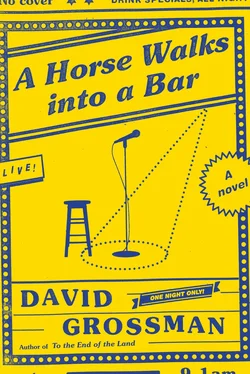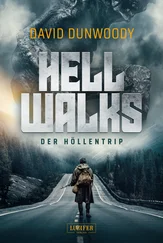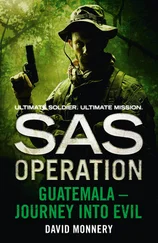He illustrates the way he leaned on the window. His head starts shaking, gently at first, then faster and stronger, until his whole body is convulsing, and it’s a wondrous sight: his features blend together, expressions cross over one another in flight like cards in a deck being shuffled. His limbs flutter and dance as he jerks around the stage, tossed from one edge to the other, then he flops onto the floor like a Raggedy Ann and lies there panting, the occasional spasm jolting his arm or leg.
The crowd resumes laughing. Even the rabble-rousers chuckle, almost despite themselves, and the little medium grins.
“I’m telling you, it was a blessing in disguise, that drrrr, ” he projects. He gets up, dusts his hands off, and smiles heartily at the man in yellow, then at the guy with the shoulders. The two of them are still resistant, with the same dubious mockery on their faces.
“ Drrrr! Can’t think anything, don’t feel anything, every thought gets crushed into a thousand pieces, I’m thought-paste, drrrr! ” He jiggles his shoulders at the little woman and she bounces and guffaws and pearly tears roll down her cheeks. The few people who notice seem to relish the little subplot. “Pitz,” he says to her, “I remember you now. Your family lived upstairs from the widow with the cats.”
She beams at him: “I told you I was. ”
“But the driver—he’s no sucker!” he yells and stomps his feet and shoots an Elvis arm up: “He’s on to the windowpane trick, he’s seen it before, other passengers have done the window-Parkinson’s act. So he starts talking to me, all casual like, points out other vehicles on the road: ‘That’s a Dodge D200 on its way to Shivta. That’s an REO taking supplies to Bahad One. That’s a Studebaker Lark from Southern Command, Moshe Dayan had one in the war. See that? He’s flashing his lights at me, he knows me.’ But me, what the hell do I have to say about that? Nothing. Zip. So he takes a different tack: ‘Did they seriously just come over and tell you, just like that?’
“Nothing from me. Drrrrr …Thought-blender. Takes me half a sec to pulverize his question into paste, mashed brain. Then suddenly my father jumps up with his lokshen noodles. I have no idea why that picture decided to pop into my mind right then. Just give me a second on this, okay? After all, it’s a pretty impressive thing that my father turns up with his lokshen all of a sudden, because why do you think he did that? Maybe it’s not a good sign? Maybe it is? What do I know. I shut my eyes tighter, bang my head against the window harder, best thing I can do now is not think, not think about anything or anyone.” He grips his head with both hands and his head rocks between them, and he yells at us as if he’s trying to drown out the noise from the pickup truck and the rattling window. “This is something I figured out from the very first minute, Netanya. That what I need to do right now is flip the circuit breaker in my brain! It’s not good for me to think about him. Not good for my father either, and basically not good for anyone to be inside my brain right now.”
He smiles sweetly and opens his arms for another hug. He gets a few confused laughs. I beam at him with every muscle in my face, to fortify him for the road ahead. I don’t know if he can see my smile. How inadequate are the expressions our faces offer us.
“Okay, so what’s up with the lokshen? I’m glad you asked! You’re an amazing crowd, you guys! A caring and sensitive crowd! So listen. You have to hear this. Once a week, after he gets done with the ledgers, he makes noodles for the week’s chicken soup. I swear, true story. So all of a sudden in the truck my brain shows me a movie, don’t ask me why, brains will be brains, don’t expect them to be logical. Here, it’s like this, this is how his hands move when he makes the dough, and this is how he rolls it out paper-thin—”
Almost without changing a single note on his face or body, he slides into character. I’ve never seen his father, only a crude imitation of him that night in the tent at Be’er Ora, but the chill that runs down my spine tells me it’s him; that is how he really is.
“And he runs with the dough looped over his arms to hang it on their bed to dry, walks quickly back and forth, zipping around the house, and everything he does he also says it out loud, a running commentary to himself: ‘Now take the dough, now put the dough on the lokshenbrat, now take the volgerholtz and make the dough rolled out.’ ”
There are some giggles, because of the accent, because of the impersonation, because of the Yiddish, because of Dovaleh’s own barreling laughter. But most of the audience sits looking at him without any expression, and I’m beginning to sense that this gaze is the audience’s most effective weapon.
“This guy, I swear, the whole time you’re at home with him, you hear him talking to himself, giving himself instructions, there’s a constant hum coming from him. Honestly, he’s a funny guy. Unless he happens to be your father. And now imagine me—me, yeah? You see me? Hello! Wake up! This is your Dovaleh talking! The star of your show! Nice city, Netanya. So I’m like in some crazy movie sitting in the middle of the desert and I suddenly see him right in front of me, my father, like he’s right there with all his gestures and his talking, and he takes a knife and cuts the rolled-up dough really fast like a machine, whack whack whack, and the lokshen fly out from under the knife, and the knife is a hairsbreadth from his fingers, and he never once gets cut. Cannot happen! My mom, by the way, was not an authorized user of knives in our home.” He produces a grin that he stretches as wide as possible, then a little wider. “For example, she was allowed to peel a banana only in the presence of a surgical team. Every single implement would wound her and make her bleed.” He winks at us and slowly runs a finger over each forearm, where he had earlier marked what he called her vein embroidery. “And suddenly, what do I see, Netanya?” His face is flushed and sweaty. “What do I see?” He waits for an answer, summoning it with his hand gestures, but no one responds. The crowd is stone cold. “I see her! Mom!” He gives an obsequious snort, aimed mostly at the two exasperated men. “Are you digging me, guys? It’s like my brain right away throws pictures of her at me, too—”
The man in the yellow jacket stands up. He slams some money down on the table and yanks his wife up by the arm. Strangely, I feel almost relieved: this is more like it. We’re back to reality. Back in Israel. The couple makes its way out, watched closely by the audience. The man with the broad shoulders obviously wants to join them. I can see the battle raging under his turtleneck shirt, but he seems to feel it would be beneath him to be a follower. Someone tries to stop the couple, urging them to stay. “Enough is enough,” the guy hisses. “People come here to have a good time, it’s the weekend, you wanna clear your head, and this guy gives us Yom Kippur.” His wife, her thick short legs teetering on stilettos, smiles helplessly and tugs her skirt down with one hand. When the man’s look meets the medium, he hesitates for a second, lets go of his wife, walks past a few tables to her, and leans over and says gently: “I suggest you leave too, ma’am. This guy is not right, he’s taking us all for a ride. He’s even making fun of you.”
Her lips tremble. “That’s not true,” she whispers, “I know him, he’s just doing make-believe.”
That whole time, onstage, Dovaleh watches the developments with his thumbs stuck in his red suspenders, nodding as though gleefully memorizing the man’s words. As soon as the couple leaves, he hurries to the small blackboard and draws two more red lines; one of them is long and thick, topped with a pinhead.
Читать дальше












